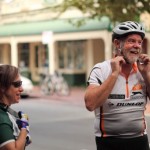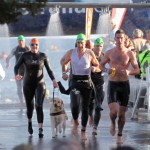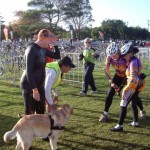Ok, this is an old story, but I just realised we didn’t have a copy on the site. Here it is…
The man on the $10,000 time trial bike turned his head and said, “Go tandem!”

This is the story of the first vision-impaired teams to compete in the event.
The WA Tandem Cycling Advisory Council is a voluntary association dedicated to providing pathways for people with vision-impairments to experience cycling at any level. Whilst WATCAC organises cycling events, it does not want to be the single outlet for vision-impaired cyclists, rather it’s aim is to encourage and support them to participate in the cycling mainstream.
In 2007, WATCAC was successful in securing a grant from the WA Department of Sport and Recreation to fund a youth program. This highly successful program has introduced about 12 young vision-impaired people to cycling. In 2009, Adriana as WATCAC’s President, and Hab as Secretary, proposed entering a youth team in the Half Ironman relay event as part of the program. It soon became apparent that two WATCAC teams would be required, one for the youngsters and one for the more mature athletes who would be “supervising” and supporting them. Thus were born team “Out of Sight” – of course the youngsters were cocky – and team “Out of Mind” – reflecting the deep reservations held by their elders.
Team Out of Sight:
Vicky Dilly* (swim)
Alishia Anderson* and Stephen Summerlin (cycle)
Paul Garwood (run)
Team Out of Mind:
Monika Volpi* (swim)
Adriana Lepore* and Hab Collier (cycle)
Keith Clark* (run)
* Denotes athlete with a vision-impairment.
Early on Sunday the 1st of May, the swimmers lined up at the start. The teams had arrived the night before and there’d been a lot of joking and carrying on, but now, on the start line, things were more serious. The event organisers had been very welcoming to the WATCAC teams and had made special provision for the vision-impaired swimmers. They’d start ahead of the others so that they’d have clear water and be able to meet their kayak-riding guides who would help them through the swim.
The hooter sounded, and the two vision-impaired swimmers were off. The crowd and other competitors who had been briefed on the special arrangements were vocal in their support – imagine swimming a triathlon without vision – unbelievable!
Out of Sight swimmer Vicky Dilly, who has minimal vision, is training at the velodrome on tandems and has ambitions to represent Australia at the London Paralympics. Before the start she was cold and nervous, but the water was calm and warm and she had no trouble meeting her escort paddler, staunch WATCAC supporter and tandem pilot Peter Hancock who was just offshore wearing a highly visible bright orange shirt. Whilst she is a strong pool swimmer, with her limited sight she had never ventured out of her depth at the beach. Now, with Peter paddling just in front of her, Vicky found herself undertaking a 1.9km ocean swim. 
Vicky: “The swim wasn’t too difficult, but I did get a bit freaked out at the furthest point from the beach. I can see a bit and it looked really, really deep. Peter was great, just in front of me all the way, but I did lose sight of him at one point. When we got back to the beach, Peter ran with me to the transition area as a guide. The spectators were cheering pretty loudly. I think the announcers had told the crowd about us, so they knew I was vision-impaired. My foster mother was watching and she told me she had tears in her eyes. I was so happy when I finished, I’d never imagined I’d ever do something like that.”
Peter: “I was amazed by Vicky’s courage. We’d tried training together – me in the kayak, her swimming – at Hillarys, but she was stung all over by jellyfish, so we hadn’t really practiced much. Vicky did much better than she expected, it was only at the end of the swim leg that the elite swimmers started to pass her. At the beach it was a bit confused. I dashed in, threw the paddle and kayak aside and tripped in my hurry to get to Vicky, who had herself tripped on seaweed as she left the water. We picked ourselves up and I ran with Vicky guiding her to the transition. It was a lot further than we expected. Vicky was completely exhausted at the end.”
Out of Mind swimmer, 59-year-old Monika Volpi lives in Busselton. Despite being a veteran of several long distance ocean swims including Busselton’s around the jetty event, Monika was nervous at the start, worried she wouldn’t make it and would let her team mates down. Illnesses that had stopped her from training and the recent deterioration of her limited vision had combined to sap her confidence. 
Monika: “I didn’t think I could do it. My husband who was escorting me in a kayak was awesome; he was shouting, “Come on, come on, you can do it”. I was crying and I was saying, “I can’t, I can’t do it”. My husband said, “OK, give up then”. That made me keep going, and I did finish under the time limit. My husband ran up the beach with me to the transition. Somewhere along the way, someone handed me the lead to my guide dog Blaze, so we all ran together. There were a lot of my friends there and a lot of support from the crowd. I was jelly at the finish, but I know I’m OK and I know that I can do this. Next year I’m determined to do it again, and to do the cycling leg as well.”
Taking over from Vicky for the cycling leg were Out of Sight cyclists Stephen Summerlin (pilot) and Alishia Anderson (stoker). Relative newcomers to tandem cycling, they are both fit and strong, and had ridden together previously, most notably on the 60km Freeway Bike Hike. Alishia has tried many sports, but seems to have found her place in cycling and is training on the velodrome and working towards the London Paralympics. Stephen, an experienced cyclist, has proved to be the Iron Man of WATCAC a title he earned at the Freeway Bike Hike for his efforts in riding 30km to the start on his bike, completing the 60km event and 60km back to the start on a tandem, then riding home, all of this despite being physically ill.
Alishia Anderson: “I was very excited, but I wasn’t nervous. We’d done the Freeway Bike Hike so I knew we could do it. We got a lot of comments from the other cyclists, “Good job!”, as they passed us. We passed bikes too. We didn’t have any incidents on the course. Stephen is a very good rider, very friendly and very supportive. We got a lot of cheers from the crowd. I want to do it again.”
Debbie Anderson (Alishia’s Mum): “It was a great event and very well organised, both by the event organisers and by WATCAC. It was very inclusive, everyone was treated the same regardless of any disability. I was very proud of Alishia and very excited.”
At the transition, Out of Mind cyclists, Adriana and Hab, took over from Monika and started the 90km cycling leg. Adriana and Hab first met 15 years ago and have been cycling together ever since. Adriana’s vision deteriorated from 15% to none at all over those 15 years, but this did not prevent her from competing on tandems at state and national level. Hab is WATCAC’s most experienced front-rider. He remembers the early days when a tandem was two single bikes welded together, team kit was king gee footy shorts and a pair of Dunlop volleys (sneakers), and a rider with a leather helmet was envied. Hab is also famous for not knowing his left from his right.
Adriana: “I was very nervous before the start, for myself and for the other competitors from both of our teams. WATCAC had invested a lot of effort in getting the teams together and I was really, really hoping that everyone would finish and would be pleased with their efforts. We were hoping that the event would be a good learning experience for the young ones who want to cycle at international level and that was the way it turned out. Vicky in particular had been so uncertain over the weeks while we were planning this, so when she came into the transition in such a good time it was the highlight of my day.”
“Personally, we had a great ride and passed 12 other bikes – we counted them! We got a lot of encouragement from the other cyclists and from the crowd. We were so pleased when we finished only 20 seconds slower than the Out of Sight tandem given that we were carrying an extra 56 years between us. We really enjoyed rubbing that in over and over again at dinner.”
Hab: “We were watching when Vicki came in to the transition. She had tried so hard she was shaking and stumbling. Adriana, Stephen, Keith and I looked at each other. Up until then, our aim had been to participate and finish inside the able-bodied cut off time of 6.5 hours, but watching Vicki we thought, “hell, we’re really in a race here” and knew that we’d have push ourselves to live up to that example.”
“I had been anxious the night before, as this event was the culmination of our youth program and I so wanted it to go well. I dreamt that night that I’d get my left and right confused and get us lost, so by the time we got on the bike I was pretty hyped. At the first corner I told Adriana that we were doing a left turn, and then turned right which was the correct direction. After that, I calmed down; followed some other bikes and we had a great ride, nearly matching the young ones as it turned out. At the transition, I bent down to take off the timing band, gave it to Keith, then turned to find Adriana, flat on her back, totally spent.”
Taking over from Alishia and Stephen for the run leg was sighted runner Paul Garwood who was filling in due to the injury of the original vision-impaired runner. Working at the Association for the Blind WA as an Orientation and Mobility Instructor, Paul knows a lot about living with a vision impairment and so was very pleased to be able to help out. As an experienced triathlete, Paul was able to instruct the team on all of the ins and outs of triathlons, the gear, the transitions and so on. At 1 hour and 41 minutes, Paul’s time for the run was inside his personal target time of 1:45.
Paul: “Having seen the others complete their respective disciplines, going hard was the only option! I loved being involved, there was such a buzz at the finish, and the sense of achievement I felt was up there with other competitions I have raced. I felt really humble, I’d just done what I normally do, but what the others had done was really special. Watching Vicky, Monika and Alishia and seeing how well they did were the highlights for me. Everyone has fears about not finishing and for the swimmers there is the fear of “what’s out there”, but how much scarier would it be if you couldn’t see? I want to be involved next year. I don’t care if I’m not in the team, I’ll help in any way I can. I’d like to do the run leg as a guide if we can find a vision-impaired runner.”
Taking over from Hab and Adriana for the running leg was former WATCAC President and experienced triathlete Keith Clark. 25 years ago when Keith did his first triathlon, he was unaware that he was losing his sight. Now, despite having only 9% vision, most of the time, the people that he competes against do not notice that Keith is any different from them. There have been occasions when Keith’s lack of sight has been more obvious.
Keith: “I have been known to overshoot corners and run over traffic cones. One time on a bike leg, I lost my way and ended up about 1km off course wondering, “where have they all gone?” Another time, I was swimming really well and was way ahead of the rest, but I couldn’t find the turning buoy. I had to tread water and wait until another swimmer went past so I could follow him. The other thing that is difficult is the drink stations, I can’t judge the position of the cups as they hand them out, so miss or spill them.”
“The Busselton course is good for me, it is flat and there aren’t a lot of kerbs to trip over. At about the 10km mark, my heel started to hurt. I didn’t know it at the time, but it was as stress fracture. It hurt so much I nearly pulled out, but I thought I couldn’t wipe out the contributions of the swimmers and riders so I finished, but I did have to slow down.”
The cut off time for able-bodied teams was 6.5 hours. Team Out of Sight finished in 5 hours 20 minutes and Team Out of Mind finished in 6 hours and 15 minutes. The Busselton Half Iron Man Triathlon was a great success story for WATCAC and there are already plans afoot for the 2011 event.
That WATCAC continues to provide such opportunities and support for people with vision impairments is testimony to the hard work of a small number of volunteers who should be acknowledged here; Adriana Lepore, Hab Collier, Greg Madson, Kirstie Brown, Trevor Maslen, Peter Hancock and Beau Tang. For more information about WATCAC, tandem cycling, and ways in which you could offer support, visit the web site at www.watcac.org.
The WATCAC participants and Committee are unanimous in congratulating the Event Organisers for a fantastically well-run event, and thank them for the ready welcome and inclusive attitude that they displayed towards WATCAC and other competitors with special needs. Thanks are also due to the WA Department of Sport and Recreation, whose grant funding financed the youth program and the entry of Team Out of Sight in the event.